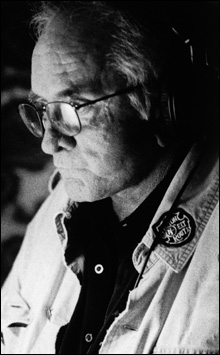
MAN OF THE BOOK: “Nothing worked out when I handled it all on my own,” he sings of his struggles with the Bible in “I Came To Believe.”
|
“The best ideas for songwritin’ are the true stories that happen — especially to people. When you get into the human spirit, you get some good ideas sometimes.”
That’s how Johnny Cash introduces “Tiger Whitehead,” a tune he wrote about a bear hunter who lived in the Tennessee mountains from 1819 to 1905. Tiger killed 99 bears during his long life, according to his tombstone outside Johnson City. The tombstone of his wife, Sally Garland, who lies in her grave next to Tiger’s, completes the legend. It explains besides raising her own children, she nurtured two bear cubs her husband had inadvertently orphaned as well as a fawn by nursing them from her own breasts. And therein lies the inspiration for Cash’s ode to courage and compassion on the frontier.
Cash was an expert at finding and composing songs that got into the human spirit, and there are plenty on two new releases from the Cash archives. The first, and better, is the two-disc Personal File (Columbia/Legacy), 49 numbers he recorded in his home studio in 1973, including “Tiger Whitehead.” He cut these songs with nothing but his own acoustic guitar for accompaniment, and they provide a vast look at the material and the ideas about the American character and its roots that influenced him, as well as his own spiritual convictions.
As an unwitting yet perfectly timed complement to Personal File, Lost Highway/American will release American V: A Hundred Highways, the last of Cash’s collaborations with rock and rap producer Rick Rubin, on July 4. No amount of clever and gracious studio support from the likes of guitarists Smokey Hormel and Mike Campbell and keyboardist Benmont Tench, the latter two from Tom Petty’s Heartbreakers, can disguise the fact that Cash was in his final months as he laid down these quivering, foggy-voiced performances. The occasional loops and other modernist frills that Rubin deploys are no substitute for the power of Cash’s own thumb-driven guitar playing, the spare-drive rod of Personal File, which had ebbed away by the time he was laying down the tracks for the fifth of his “American Recordings” in 2002.
Although Rubin contends that the songs on American V are those Cash wanted us to hear, it might be more accurate to say that baldly sentimental choices like Rod McKuen’s “Love’s Been Good to Me” and Gordon Lightfoot’s “If You Could Read My Mind” reflected his thoughts and reflections as he wasted away. Sure, naked sentiment has always been part of his canon, and that’s also reflected in Personal File. But the Man in Black’s conviction and authority had waned by the time he began work on his final collaboration with Rubin. The same can’t be said for his first four “American Recordings,” which took him to a new generation of youthful listeners and restored his stalwart fans’ faith in his art. American V is the sound of a once powerful and supremely willful man battered by both illness and the heartbreak that came with the death of his beloved June Carter Cash, four months before his own passing in September 2003.
What’s most interesting about American V are the last two songs Cash wrote. “Like the 309” is a chipper-paced death ballad in which Cash plays a failing man contemplating his last railroad trip — in a pine box in a baggage car. Hormel’s slide guitar gives the tune a righteous blues feel. “Like the 309” would sound right at home on Personal File, its feistiness attesting to the strong American heart Cash came to embody through song.
That strength, and his dedicated exploration of the human spirit, drives all 25 tunes on the first disc of Personal File — the collection of songs he really wanted people to hear, or at least to preserve for posterity. There’s a tale about a railroad engineer who’s at the throttle though he’s fraught with worry about his infant’s possible health; another about a man whose mother dies and whose father pleads for reconciliation and reunion. There are also old chestnuts from the Anglo folk tradition like “Galway Bay” and “Drink to Me Only with Thine Eyes,” and a version of the first song Cash ever performed in public at a talent show in Dyess, Arkansas, “Far Away Places.” Some of these songs, like the tribute to his dear aunt “Vergie” and the songwriter’s ode “A Fast Song,” Cash wrote himself but never recorded for formal studio release. Others were pulled from the catalogues of his friends, like Johnny Horton’s “When It’s Springtime in Alaska (It’s Forty Below)” and Lefty Frizzell’s “Saginaw Michigan.”